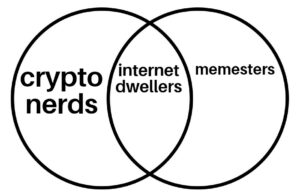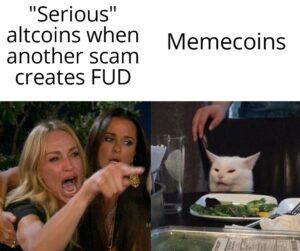It seems like, lately, half the crypto-related headlines in the news are about Shiba Inu Token and DogeCoin. The memecoin wars are no joke—even though they’re a literal joke—as the two top dogs’ joint valuation pushed past $80 billion. The world’s favorite (or most *eyeroll* depending on how you look at it) memecoin shill, Elon Musk, is at the center of the controversy, as always. He tweeted that he owns BTC, ETH, and DOGE, but not SHIB. Meanwhile, Shiba Inu itself claims to be the Doge killer. So what’s the deal with all these memecoins and jokes coming at you faster than you can sort by new on the r/dankmemes subreddit?
A memecoin origin story
The OG memecoin, Doge, was created for the lolz in 2013. It had no utility and was meant to satirize reckless investors who wontonly bought into altcoins strictly for #DemGainz. And even though it came on the scene a few years after Bitcoin had already begun pumping its way to $955.85, Doge was quickly ensconced as part of crypto culture. After all, in the venn diagram of memesters and crypto enthusiasts back then, the center overlap of living online was pretty large.
 Memes were part of internet culture and so was crypto—and that’s true to this day. The doge meme was one of the pillar memes of that era and, of course, a couple of engineers decided it would be funny to mock crypto speculators by creating a coin that was a literal meme. But the joke was on them when Doge actually became a “successful” altcoin with apparent longevity, still kicking almost a decade later.
Memes were part of internet culture and so was crypto—and that’s true to this day. The doge meme was one of the pillar memes of that era and, of course, a couple of engineers decided it would be funny to mock crypto speculators by creating a coin that was a literal meme. But the joke was on them when Doge actually became a “successful” altcoin with apparent longevity, still kicking almost a decade later.
Enter Elon
People who were at least somewhat familiar with meme culture or crypto had heard about DogeCoin in its early years, but it really started going crazy with retail investors when Elon Musk got to tweeting about it. Since then, the price has been seen to pump when Elon loads up a fresh Doge meme and hits send tweet. It’s a common belief that whale manipulation largely drives Doge’s price action, and Elon is a prime whale suspect.
Now though, the battle between Doge and Shiba Inu is fuel on the fire for everyone who wants to be a part of the hype. It’s a pretty new phenomenon to be able to toss a few bucks at a joke just to feel like you’re in on the fun and actually getting some crazy returns—but that’s where we are.
Anatomy of a memecoin
Doge and Shiba Inu may be the two highest-profile memecoins but they’re definitely not the only ones. There are so many popping up all over the place that it’s hard to keep track of them. Depending on your crypto investing philosophy, you may not care about the difference between a good altcoin like ETH and the plethora of memecoins. But if you’re a degen or someone who wants to make it rain and get some laughs along the way, memecoins might be right up your alley.
Memecoins are for the lolz
Like Doge back in the day, memecoins are specifically created for their cultural meaning—not for any special or useful utility. Forget about scaling solutions, challenging central powers, or banking the unbanked. Memecoins are for trolls and satirists.
It’s true that psychology and public fear and greed play into all markets. So, of course, memecoins take that concept to the extreme by co-opting a symbol, joke, or cultural trend that has some kind of sentiment attached to it and pushes hype into the red zone through influencers and a sense of community excitement (also known as FOMO). When it comes to the actual valuation of a meme as a business model though…well, just stop asking questions, would you?
Sh*tcoins and scams
Almost a decade in, it’s hard to argue that Doge is a complete scam. At least it’s not a rugpull. Plenty of people would still insist that it’s a sh*tcoin, but, of course, beauty is in the eye of the beholder on that front. However, there are lots of memecoins that can only be described as sh*tcoins.
 It’s much easier to create coins today than it was when Doge was created, and the internet, as always, is rife with trolls. A coin can easily be nothing to begin with and end as nothing because it has literally no value, no utility, and no cultural worth. It could also be a legitimate scam, rather than simply a gigantic failure. After the popular Netflix show Squid Game became a cultural phenomenon, hype saw tons of people ape into SQUID and lose their shirts when they found out it was a rugpull scam.
It’s much easier to create coins today than it was when Doge was created, and the internet, as always, is rife with trolls. A coin can easily be nothing to begin with and end as nothing because it has literally no value, no utility, and no cultural worth. It could also be a legitimate scam, rather than simply a gigantic failure. After the popular Netflix show Squid Game became a cultural phenomenon, hype saw tons of people ape into SQUID and lose their shirts when they found out it was a rugpull scam.
Shilling and hyping
If you went and created a random memecoin for funsies and just gave it to your friends and did nothing else, it probably wouldn’t rocket anywhere fast. Just like memes themselves, they gain value when they go viral. That’s why, for any memecoin that wants to flex, it needs some hype masters.
This is where influencers come in. Elon, of course, is the biggest hype man of all, but so far, his memecoin clout has only been wielded for Doge. Marketing is key for memecoins since they have no real use, and paying influencers to help pedal them is a very common tactic.
Legitimate altcoins
A Bitcoin maximalist with laser eyes might say that no altcoin is legitimate and they may know that they’re talking about. Be that as it may, there is a distinct difference between altcoins with some kind of utility and memecoins. Serious altcoins that create real technology solutions, wear ties, and starch their collared shirts, separate themselves from the nonsense clownshow of memes—as they should.
But that doesn’t mean you’re a bad person if you want to grab some memecoins and run out the window laughing. Cultural value clearly has real value (just ask Kim Kardashian’s bank account), and if you know how to monetize that, more power to you.
Risks and other considerations
I would be remiss if I didn’t make sure to emphasize the risks of memecoins. I have confidence that you’re wise enough to see these risks for yourself. But when too many suckers unsuspecting investors flush billions of dollars down the internet toilet, it’s worth mentioning that everyone should tread carefully.

Prices can quickly bottom out and never bounce back. Scams can lead you down a garden path to destruction and crying into your cereal when you wake up to an empty wallet. You could simply mis-time your trades and lose out when you didn’t need to. There are all kinds of risks. But, if you go in with eyes open and nerves of steel, there are plenty of reasons to invest in memecoins.
Speculation
If you had invested $500 in Doge back in 2016, you’d have hit $1 million by the summer of 2021. Try to convince yourself that’s not a great speculation. Yes, of course you’re liable to lose 100% on a wild and highly risky bet. But if you speculate well, diversify, and don’t plow your entire savings into a single play hoping to ride the pump, only to get gashed in the dump, it’s possible to come out on top. If you have $100 to invest, lose $10 on nine coins but make $200 on the tenth, who am I to stop you?
Community
Memes are a form of community, even boomers on Facebook understand that when they keep shoving Minion memes into your timeline. Are you seriously going to say you don’t want to read a headline like, “Doge surges with latest Elon tweet,” and be able to turn to your coworkers with a smug grin and say, “Yeah, I bought Doge ages ago.”
To rub it in your mom’s face
Even the hardest of mothers will eat the words, “Stop playing around on the internet and get a job!” when you roll up on Thanksgiving dinner in that lambo. Am I right or am I right?
Memes aren't going away, neither are memecoins
For better or worse, internet, meme, and crypto culture are all intertwined. Gen Z is as stubborn about that fact as boomers were about needing to cut your mohawk. The native tech generations look at legacy institutions and stuffy attitudes with the kind of smirk that’s always followed by some quality sh*tposting. Marty McFly wanted flying cars, but he got something better: memes.
The future is now, old man.
 Young investors (and older ones who keep things hip) are building comradery and community around the giant inside joke that, to them, everything is a joke—and that’s serious. Satirizing and mockery is part of the vibe in crypto culture and that’s probably not going to change any time soon. But if you know why you’re investing in meme coins, you want to have some fun, and the stick up your ass is starting to chafe, jump in—the memecoin water is fine!
Young investors (and older ones who keep things hip) are building comradery and community around the giant inside joke that, to them, everything is a joke—and that’s serious. Satirizing and mockery is part of the vibe in crypto culture and that’s probably not going to change any time soon. But if you know why you’re investing in meme coins, you want to have some fun, and the stick up your ass is starting to chafe, jump in—the memecoin water is fine!
About the Author

Michael Hearne
About Decentral Publishing
Decentral Publishing is dedicated to producing content through our blog, eBooks, and docu-series to help our readers deepen their knowledge of cryptocurrency and related topics. Do you have a fresh perspective or any other topics worth discussing? Keep the conversation going with us online at: Facebook, Twitter, Instagram, and LinkedIn.


